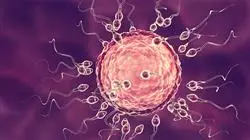University certificate
The world's largest faculty of nursing”
Introduction to the Program
A highly qualified Postgraduate certificate that prepares the nursing professional to act with safety and solvency in the Study of Male Infertility"

The main objective of this Postgraduate certificate is to prepare nurses in the field of male infertility. This specialization is extremely necessary, since the nursing staff is involved in many of the processes carried out in the Assisted Reproduction Units, such as the performance of seminograms, the analysis and processing of samples, seminal freezing, seminal lavage or even managing the male donor bank.
In order to prepare our students in the most complete way possible, we begin by explaining how the initial study of the patient is performed in consultation, also covering the complementary explorations that may arise, depending on the patient, as well as the genetic studies that can be performed.
Other approaches that will be developed in the Postgraduate certificate are the basic aspects of the seminogram, an essential technique in seminal diagnosis. Once this technique is clear, the analysis and processing of samples for the different assisted reproduction techniques will be explained in detail, to continue with other widely used techniques, semen freezing and semen washing for HIV, Hepatitis B and Hepatitis C seropositive males.
We will explain in detail what semen donation is and how it works, three of the most widely used complementary sperm selection techniques, MACS, IMSI and hyaluronic acid based selection.
Finally, the nursing staff will be educated in the use of antioxidants, a topic that is currently on the rise and which will be very necessary in practice.
With this Postgraduate certificate you will be able to combine a high intensity specialization with your professional and personal life, achieving your goals in a simple and real way"
This Postgraduate certificate in Pharmacology in Assisted Reproductive Nursing contains the most complete and up-to-date scientific program on the market. The most important features include:
- The latest technology in online teaching software
- A highly visual teaching system, supported by graphic and schematic contents that are easy to assimilate and understand
- Practical cases presented by practising experts
- State-of-the-art interactive video systems
- Teaching supported by telepractice
- Continuous updating and recycling systems
- Autonomous learning: full compatibility with other occupations
- Practical exercises for self-evaluation and learning verification
- Support groups and educational synergies: questions to the expert, debate and knowledge forums
- Communication with the teacher and individual reflection work
- Content that is accessible from any fixed or portable device with an Internet connection
- Complementary documentation banks permanently available, even after the Postgraduate Certificate
Acquire the necessary skills to work in the Study of Male Infertility in Assisted Reproduction, with the solvency of a high-level professional"
Our teaching staff is made up of professionals from different fields related to this specialty. In this way we ensure that we deliver the educational update we are aiming for. A multidisciplinary team of professionals prepared and experienced in different environments, who will develop the theoretical knowledge in an efficient way, but, above all, will put at the service of the Postgraduate certificate the practical knowledge derived from their own experience: one of the differential qualities of this specialization.
This mastery of the subject matter is complemented by the effectiveness of the methodological design of this Postgraduate certificate in Pharmacology in Assisted Reproduction for Nursing. Developed by a multidisciplinary team of Postgraduate Diplomas, it integrates the latest advances in educational technology. This way, you will be able to study with a range of comfortable and versatile multimedia tools that will give you the operability you need in your education.
The design of this program is based on Problem-Based Learning: an approach that conceives learning as a highly practical process. To achieve this remotely, we will use telepractice learning: with the help of an innovative interactive video system, and learning from an expert, you will be able to acquire the knowledge as if you were actually dealing with the scenario you are learning about. A concept that will allow you to integrate and fix learning in a more realistic and permanent way.
The learning of this Postgraduate certificate is developed through the most advanced teaching methods in online teaching to guarantee that your effort will have the best possible results"

Our innovative telepractice concept will give you the opportunity to learn through an immersive experience, which will provide you with a faster integration and a much more realistic view of the contents: “Learning from an expert"
Why study at TECH?
TECH is the world’s largest online university. With an impressive catalog of more than 14,000 university programs available in 11 languages, it is positioned as a leader in employability, with a 99% job placement rate. In addition, it relies on an enormous faculty of more than 6,000 professors of the highest international renown.

Study at the world's largest online university and guarantee your professional success. The future starts at TECH”
The world’s best online university according to FORBES
The prestigious Forbes magazine, specialized in business and finance, has highlighted TECH as “the world's best online university” This is what they have recently stated in an article in their digital edition in which they echo the success story of this institution, “thanks to the academic offer it provides, the selection of its teaching staff, and an innovative learning method aimed at educating the professionals of the future”
A revolutionary study method, a cutting-edge faculty and a practical focus: the key to TECH's success.
The most complete study plans on the university scene
TECH offers the most complete study plans on the university scene, with syllabuses that cover fundamental concepts and, at the same time, the main scientific advances in their specific scientific areas. In addition, these programs are continuously being updated to guarantee students the academic vanguard and the most in-demand professional skills. In this way, the university's qualifications provide its graduates with a significant advantage to propel their careers to success.
TECH offers the most comprehensive and intensive study plans on the current university scene.
A world-class teaching staff
TECH's teaching staff is made up of more than 6,000 professors with the highest international recognition. Professors, researchers and top executives of multinational companies, including Isaiah Covington, performance coach of the Boston Celtics; Magda Romanska, principal investigator at Harvard MetaLAB; Ignacio Wistumba, chairman of the department of translational molecular pathology at MD Anderson Cancer Center; and D.W. Pine, creative director of TIME magazine, among others.
Internationally renowned experts, specialized in different branches of Health, Technology, Communication and Business, form part of the TECH faculty.
A unique learning method
TECH is the first university to use Relearning in all its programs. It is the best online learning methodology, accredited with international teaching quality certifications, provided by prestigious educational agencies. In addition, this disruptive educational model is complemented with the “Case Method”, thereby setting up a unique online teaching strategy. Innovative teaching resources are also implemented, including detailed videos, infographics and interactive summaries.
TECH combines Relearning and the Case Method in all its university programs to guarantee excellent theoretical and practical learning, studying whenever and wherever you want.
The world's largest online university
TECH is the world’s largest online university. We are the largest educational institution, with the best and widest online educational catalog, one hundred percent online and covering the vast majority of areas of knowledge. We offer a large selection of our own degrees and accredited online undergraduate and postgraduate degrees. In total, more than 14,000 university degrees, in eleven different languages, make us the largest educational largest in the world.
TECH has the world's most extensive catalog of academic and official programs, available in more than 11 languages.
Google Premier Partner
The American technology giant has awarded TECH the Google Google Premier Partner badge. This award, which is only available to 3% of the world's companies, highlights the efficient, flexible and tailored experience that this university provides to students. The recognition as a Google Premier Partner not only accredits the maximum rigor, performance and investment in TECH's digital infrastructures, but also places this university as one of the world's leading technology companies.
Google has positioned TECH in the top 3% of the world's most important technology companies by awarding it its Google Premier Partner badge.
The official online university of the NBA
TECH is the official online university of the NBA. Thanks to our agreement with the biggest league in basketball, we offer our students exclusive university programs, as well as a wide variety of educational resources focused on the business of the league and other areas of the sports industry. Each program is made up of a uniquely designed syllabus and features exceptional guest hosts: professionals with a distinguished sports background who will offer their expertise on the most relevant topics.
TECH has been selected by the NBA, the world's top basketball league, as its official online university.
The top-rated university by its students
Students have positioned TECH as the world's top-rated university on the main review websites, with a highest rating of 4.9 out of 5, obtained from more than 1,000 reviews. These results consolidate TECH as the benchmark university institution at an international level, reflecting the excellence and positive impact of its educational model.” reflecting the excellence and positive impact of its educational model.”
TECH is the world’s top-rated university by its students.
Leaders in employability
TECH has managed to become the leading university in employability. 99% of its students obtain jobs in the academic field they have studied, within one year of completing any of the university's programs. A similar number achieve immediate career enhancement. All this thanks to a study methodology that bases its effectiveness on the acquisition of practical skills, which are absolutely necessary for professional development.
99% of TECH graduates find a job within a year of completing their studies.
Postgraduate Certificate in Pharmacology in Assisted Reproduction for Nursing
Pharmacology in assisted reproduction is one of the most important elements in this area, since reproductive treatments require the use of drugs that must be administered with precision and care to achieve the success of the process. This is why it is essential for nurses to keep up to date in this field, managing the latest scientific evidence available. For this reason, TECH has carried out the Postgraduate Certificate in Pharmacology in Assisted Reproduction for Nursing, a program that will place you at the forefront of an increasingly demanded health field.
Get updated in pharmacology in assisted reproduction in only six weeks.
The Postgraduate Certificate of the Faculty of Nursing is the best option in the educational panorama to update you in this area. Through this course, you will be able to learn the state-of-the-art protocols for the effective administration of drugs to women who have undergone a reproductive treatment. All this, enjoying a 100% online methodology that will enable your learning without having to give up your daily personal and professional obligations.







